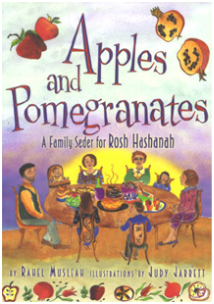
Apples and Pomegranates: A Family Seder for Rosh Hashanah
Named a 2004 Notable Children's Book by the Sydney Taylor Book Award Committee of the Association of Jewish Libraries
By Rahel Musleah
Illustrated by Judy Jarrett
Lerner / Kar-Ben Publishing
ISBN: 1-58013-123-9
Price: $5.99
Publication date: July 2004
Available as an eBook in five different formats, including Kindle
Listen to The Book of Life podcast celebrating new beginnings with Rahel Musleah.
Reviews
"...Apples and Pomegranates isn't only for families with children. Anyone with even a grain of curiosity about other cultures and a sense of fun will take pleasure from this joyfully illustrated book."
Cynthia Ramsay, Jewish Western Bulletin, Canada
"Musleah's book...reminds us that Rosh Hashanah is not only a somber day of judgment for the past but a joyful new beginning."
Gershom Gorenberg, jbooks.com
"...A book for the holiday table."
– Sandee Brawarsky, New York Jewish Week
"...Stories and ideas enrich and enliven this slim, colorfully illustrated volume...Recipes give your table the flavor of a time that is not just prayerful but hopeful and, of course, delicious."
Susan Adler, Hadassah magazine
"...Filled with information...A great resource for a school, community or synagogue library..."
Kathe Pinchuck, Association of Jewish Libraries' Newsletter
"...Children will be fascinated with this custom and may want to initiate it at their family Rosh Hashanah dinners."
Sybil Kaplan, Baltimore Jewish Times
"...A unique look at a tradition practiced by Sephardic and Mizrahi communities...Musleah's stories...are well told and entertaining...Colorfully laid out, pleasantly illustrated...A beautiful book describing a precious tradition. For Ashkenazi families, it fills a major gap in our awareness of Rosh Hashanah traditions."
Deanna Silverman, Ottawa Jewish Bulletin
Send your own review
A seder for Rosh Hashanah?
The custom dates back 2000 years to the Talmud, which suggests that at the start of the New Year people should eat foods that grow abundantly and that symbolize fertility, prosperity, beauty, and freedom. Jewish communities around the world, especially Sephardic and Mizrahi communities from Spain, Portugal, North Africa and the Middle East, have long celebrated Rosh Hashanah by blessing the new year with symbolic foods.
Organized around traditional foods including apples, pomegranates, pumpkins, leeks, beets, beans and dates, the seder proceeds in a prescribed order (seder means "order") with appropriate blessings, commentary, stories, and wordplays. Judy Jarrett’s lively, four-color illustrations and intricate borders perfectly complement the text.
Each section of author Rahel Musleah’s carefully researched volume includes "Think" questions and activities to extend the seder and to provoke discussions throughout the High Holiday season. The book concludes with holiday recipes, music, and New Year food customs from around the world.
The custom dates back 2000 years to the Talmud, which suggests that at the start of the New Year people should eat foods that grow abundantly and that symbolize fertility, prosperity, beauty, and freedom. Jewish communities around the world, especially Sephardic and Mizrahi communities from Spain, Portugal, North Africa and the Middle East, have long celebrated Rosh Hashanah by blessing the new year with symbolic foods.
Organized around traditional foods including apples, pomegranates, pumpkins, leeks, beets, beans and dates, the seder proceeds in a prescribed order (seder means "order") with appropriate blessings, commentary, stories, and wordplays. Judy Jarrett’s lively, four-color illustrations and intricate borders perfectly complement the text.
Each section of author Rahel Musleah’s carefully researched volume includes "Think" questions and activities to extend the seder and to provoke discussions throughout the High Holiday season. The book concludes with holiday recipes, music, and New Year food customs from around the world.
Rahel Musleah explaining the Rosh Hashanah Seder on The Jewish Channel's "Modern Jewish Mom: High Holidays," copyright 2010, The Jewish Channel. Used with permission. All Rights Reserved. www.tjctv.com
Apples and Pomegranates: A Rosh Hashanah Seder
by Rahel MusleahEvery holiday has its aura. Pesah has a scrubbed cleanliness; Purim, a cookie-dough indulgence, Sukkot, a back-to-nature thankfulness. Rosh Hashanah has its aura too. For most of us, it’s one that begins a season of awe, judgment and repentance.
For me, the start of a new year is a time of blessing and renewal, a different focus than what often feels like a lofty liturgical solemnity. I’m not suggesting party hats and confetti, just a little more optimism and joyfulness. Except for dipping apples in honey and sharing a holiday dinner, home rituals that create memory are largely missing from Rosh Hashanah.
In this respect, families of Sephardic and Mizrahi origin have a secret to share with the rest of the Jewish world....
Read more